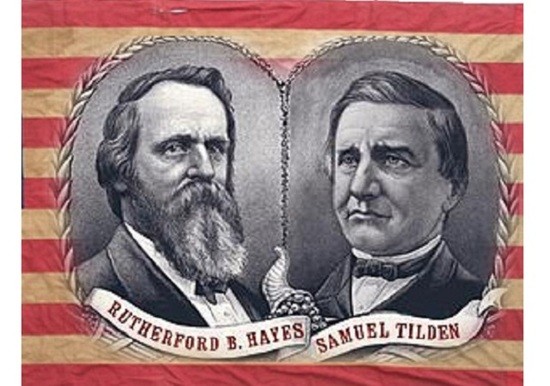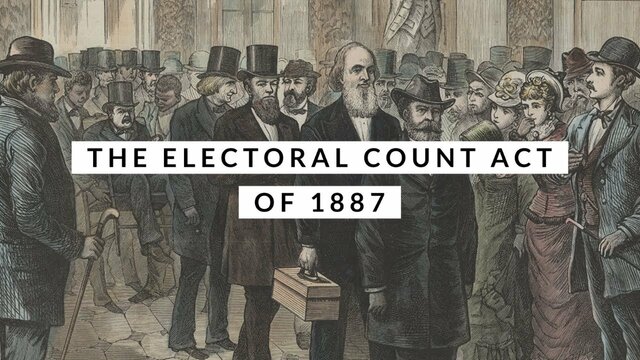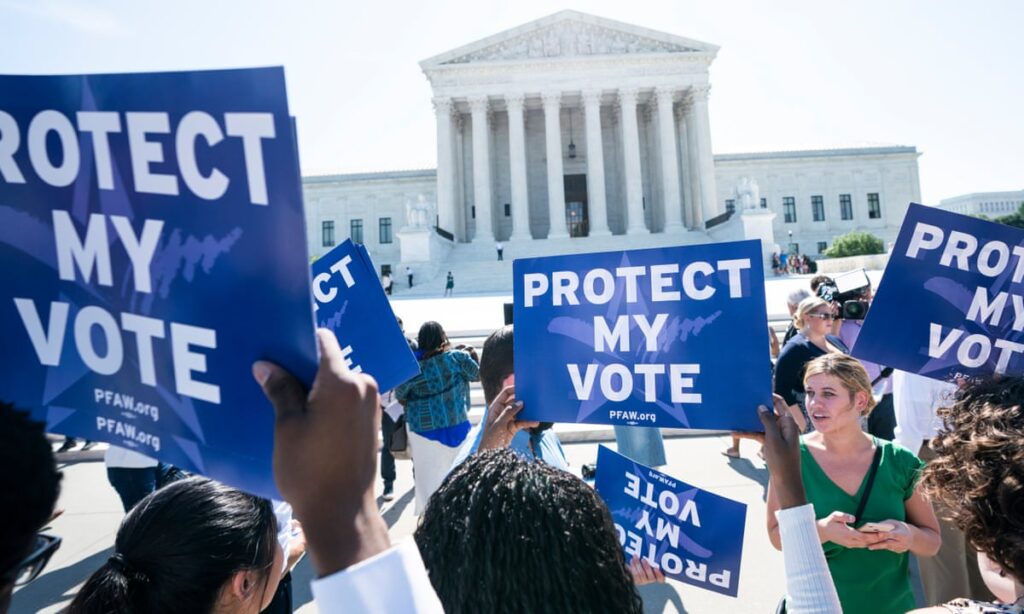Reforming the Electoral Count Act Is a ‘Back Door’ to Securing the Vote

Both voting rights bills died in the Senate and elections remain vulnerable to partisan bad actors. Let’s embrace what’s possible.
Prologue: The Disputed 1876 Presidential Election
The disputed presidential election of 1876 occurred as America was licking its wounds after a bloody Civil War and during the painful process of reintegrating Southern states into the Union. There was no clear-cut favorite to succeed retiring President Ulysses S. Grant.
Republicans nominated Ohioan Rutherford B. Hayes to continue the abolitionist policies started by Abraham Lincoln. Democrat Samuel J. Tilden, former governor of New York, was favored by the South still in the throes of Reconstruction. Newspapers predicted a close race.
Oh, it was close. Election Day came and went and no clear winner emerged. Both parties claimed victory in the Southern states of South Carolina, Florida, and Louisiana, where violence against voters of color tainted the vote tallies. In Oregon, it turned out that one Hayes elector was an officeholder, which was forbidden by the Constitution. Oregon’s Democratic governor replaced him with a Tilden elector.

In those four states, competing slates of electors (sound familiar?) cast their ballots in their respective state capitals on December 6, 1876. The matter was left to a Republican-controlled Congress in which a 15-person “returning board” voted along party lines to choose which slates counted. Hayes was elected president by one electoral vote (even though he lost the popular votes by three points). The Democrats were given the consolation prize of withdrawing Union troops from the South.
What supreme irony: the abolitionist Hayes was the man responsible for ending Reconstruction.
Futile Compromise
It can be said with confidence that nobody was happy with the compromise that resolved the 1876 presidential election. Rutherford B. Hayes would become a one-term president. Though the US Constitution regulates the counting of electoral votes, its provisions have proven insufficient in close, hotly-contested elections…especially in which there are bad-faith partisan players.
The next two presidential elections were also very close. Abuses of power lurked in every dark corridor. Congress said “Enough!” and wrote legislation that would become the Electoral Count Act of 1887.
The Electoral Count Act (ECA) attempted to clarify “how Congress can hear and resolve challenges to a state’s certification of electoral votes.” That’s a tall order and the bill’s language was “very confused, almost unintelligible,” according to the Florida Law Review.
For example, the law is silent about the vice president’s ceremonial role in the electoral votes counting process, with no specific language stating he or she does not have the power to resolve disputes. The ECA was the precise law that Trump lawyers tried to twist to get Mike Pence to block certification on Jan. 6. We are of course thankful that Pence did the right thing. It could have easily gone the other way, fomenting the mother of all Constitutional crises.
“Overturn the Election”
According to Mother Jones magazine, Donald Trump now explicitly says that Pence should have “overturned the election,” and the ex-president attacked the bipartisan effort to reform the Electoral Count Act.
Of course Trump would say that. Intended to provide an orderly process to resolve an 1876-style contested election, the ECA has been used by both parties (but mainly the GOP) to object to electoral vote outcomes (2004, 2020), with Congress being the court of last resort.
With the 2022 midterms threatening to cultivate an anti-democratic majority, whipped into a frenzy about a fictional stolen election, now is the time to secure election protections that the ECA was meant to provide.
Bipartisan Reform
With both voting rights bills recently dying in the Senate, reforming the ECA is a convenient “back door” to eliminate the worst cases of partisan manipulation.
Its roots are bipartisan: Republican Sen. Susan Collins is convening a legislative working group whose supporters include Mitt Romney and–dare I say it–Mitch McConnell. According to an opinion piece in the New York Times, the Collins group is…
…reportedly considering making it much more difficult for Congress to question properly certified state election results, clearly specifying that the vice president’s role in counting the electoral votes is limited, protecting election officials from harrassment and intimidation while they are carrying out their lawful functions, and granting states new funding to improve their voting systems.
Larry Diamond
A Roadmap to Election Reform
A group called Women for Ethical Government recently released a handy information sheet stating why the Electoral Count Act is ripe for reform. Their bullet points, my words:
- Democratic Stability: Our democratic institutions should be protected from the abuse of power. Faith in our elections is a pillar of our democracy.
- National Security: Election disputes that disrupt a peaceful transfer of power make the US vulnerable to foreign threats.
- Economic Stability: The markets don’t like the chaos and uncertainty resulting from disputed election results.
- States’ Rights: The process by which a state can choose its electors and certify its election results should be protected from internal (say, a rogue governor or legislator) and external (e.g., Congressional) influences, and should be based on who wins the election.
- Protection of Election Officials: Professional election officials should be free from partisan pressure. The hour-long phone call Trump made to Georgia Secretary of State Brad Raffenperger, the one about “finding” 11,700 votes, could have begun and ended by Raffensperger saying to Trump, “Sir, I cannot talk to you. It’s against the law.”
Eyeing Constitutional Democracy With Bad Intent
Gadfly attorney George Conway, the one married to former Trump official Kellyanne Conway, expressed outrage over Trump admitting to the world that he wanted Mike Pence to “overturn the election.”
“Every so often, when it comes to his bad intent, he tells the truth and that’s what he’s telling us here.” roared Conway. “He wanted this election to be overturned, against the results, against the will of the people. He wanted to end constitutional democracy in the United States.”
Coda
This is the tough part. The resilience of American democracy has depended in part on key participants acting in good faith to preserve the institutions that have served us well for almost 250 years. We now know there are important players in the opposition party who have no allegiance to democracy.
The peaceful transfer of power is the key to it all. The Jan. 6 insurrection is our wake-up call. None other than Mike Pence has called the insurrection un-American. There is nothing more important than making sure Jan. 6 never happens again.
They have their work cut out for them.
Editor’s note: This is Part II of an article that began with a report on fraudulent Trump elector slates. You can read Part I here.





















































































































